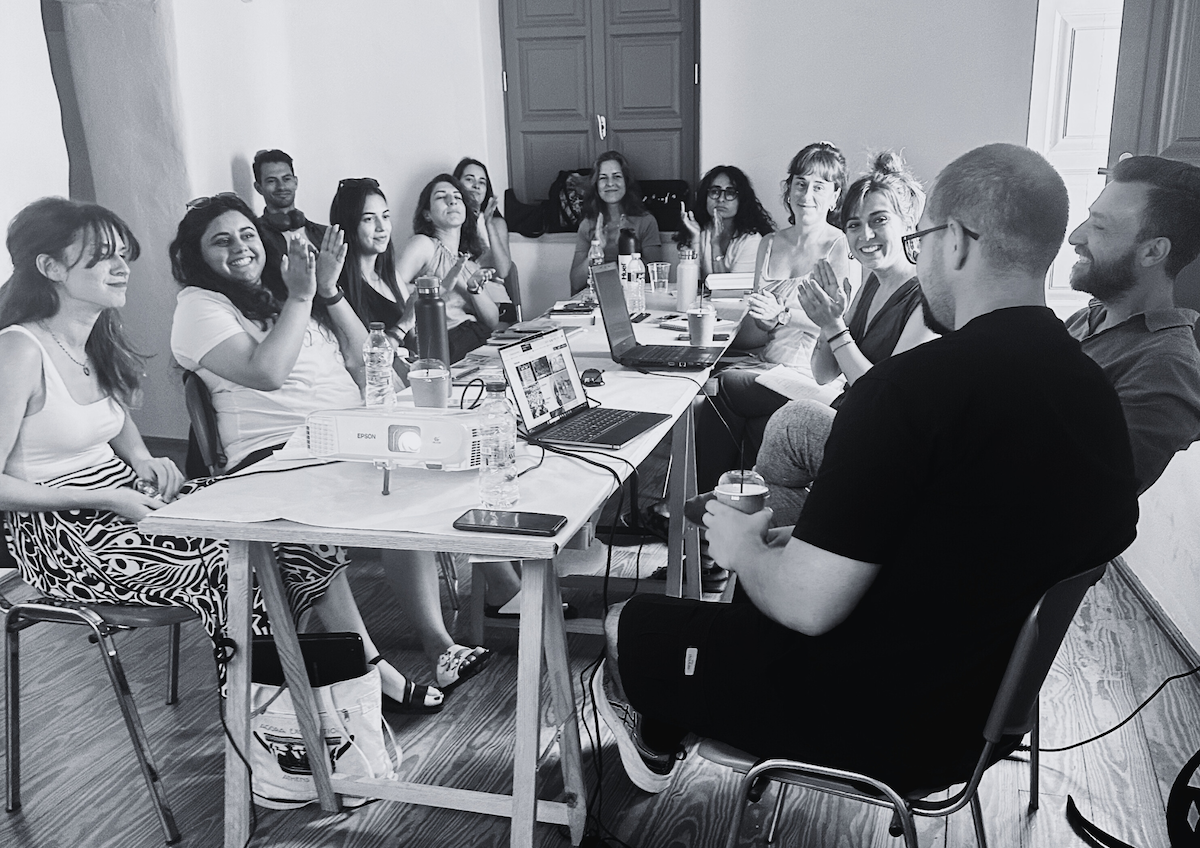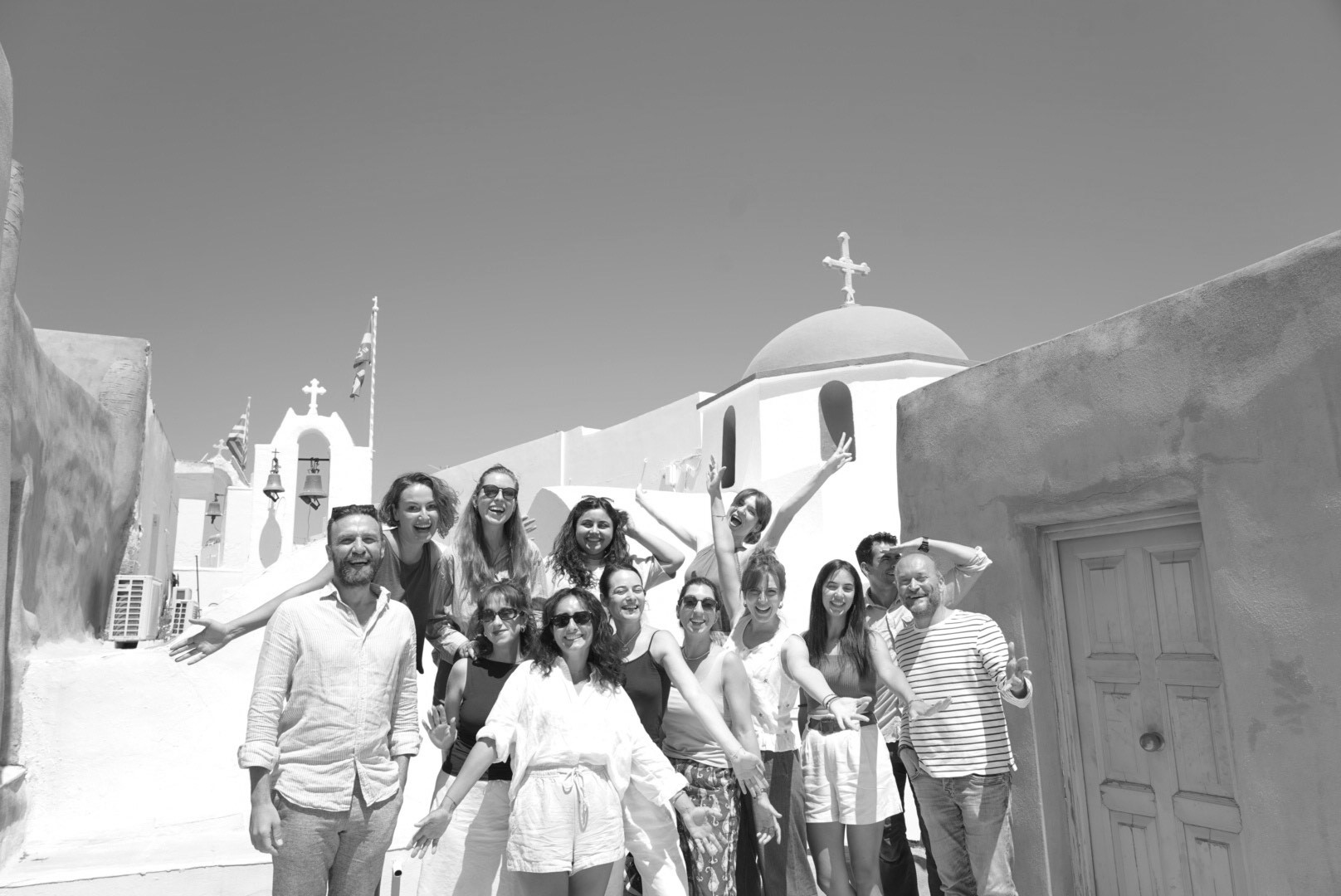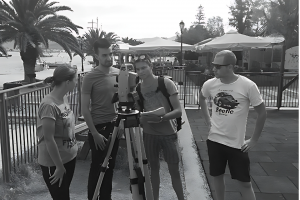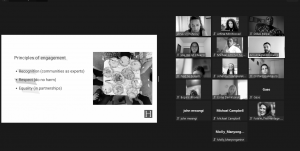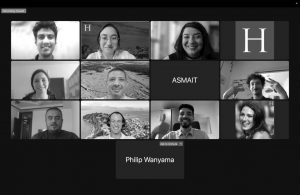: Summer School
New dates for HERITΛGE summer field schools 2025
HERITΛGE is pleased to announce new dates for our 2025 summer schools. The HERITΛGE summer schools are excellent opportunities for heritage professionals and students to develop existing knowledge and learn new skills for managing heritage. Applicants do not have to have previous experience in the particular field of study and we welcome students eager to improve their understanding in new areas of heritage. Places are limited so we recommend applying soon!
HERITΛGE is offering two programmes for 2025:
Engaging Communities in Cultural Heritage
Date: 16 June – 6 July 2025
Location: Paros, Greece (in person and online)
Language: English
Lecturers: Dr Aris Anagnostopoulos and Dr Lena Stefanou alongside guest lecturers, Dr
Evangelos Kyriakidis and Vicky Papadimitriou
This hybrid programme aims to develop a different approach to community engagement that is based on social and artistic research with community-led initiatives. Through meetings, assignments and fieldwork, students will be introduced to the principles of community engagement and learn how these can be applied in different circumstances, appropriately addressing cultural differences within the field. The duration of the course is two weeks, with five three-hour meetings. Fieldwork will take place on the island of Paros, in Greece.
I applied to this workshop to improve my fieldwork methodology, and I found it greatly helped
me develop because I was able to learn about those details that we cannot learn without
going into the field and starting to work. It has really helpful for me on how to conduct my
research questions and how to engage with the people I am interviewing. (Elif Aydin, a PhD
Candidate at Istanbul Technical University. Engaging Communities in Cultural Heritage,
2024)
Click here for more information and how to apply.
Digital Tools for Cultural Heritage Management
Date: 13 May-17 June 2024 (applications now open)
Location: Nafplio, Greece (in person and online)
Language: English
Lecturer: Dr Cornelis Stal
HERITΛGE have collaborated with HOGENT University (Belgium) to deliver three integrated and consecutive specialist courses in geomatic topic. These courses will cover GIS, Photogrammetry and image-based 3D modelling, and Terrestrial laser scanning*. Students will be provided with hands-on instruction, hands-on demos and exercises in each. Skills taught will help heritage professionals in restoration, documentation, or visualization projects specifically but can be applied to a range of other fields.
*Please note that these specialist courses can be booked individually. For those intending to just do sections of the field summer school, please contact at the email [email protected] for further information and arrangements.
I decided to take the course because I think it could be very useful in my work both for documenting for the future, using it for planning in daily work with managing heritage buildings. Also to make available on the internet for people who are not able to visit in person.(Helen Myhr Radell, Project Leader, Stiftelsen Skansen. Digital Tools for Cultural Heritage Management, 2024)
It was amazing, moving from place to place from old archaeological sites to old church photogrammetry and dealing with all this senior equipment like drones, laser scanning. Processing all this data gives you fuller information and the full picture about the process so you will then be able to it by yourself! (Khaled Hiatlih, Co-founder Heritage Roots. Digital Tools for Cultural Heritage Management, 2024)
Click here for more information and how to apply:
This course is supported by Metashape.
Community Engagement Encounters in Paros
Twenty two cultural heritage managers were able to explore the Greek island of Paros and dive deep into its communities during this years’ Engaging Communities in Cultural Heritage Summer Field School that ran from June 17 to June 30. Eleven of our trainees attended online and another eleven in person.
“The Summer School was amazing, very intense, both in terms of our schedule but also in terms of the relationships that we were building and the activities we undertook outside the classroom, from participant observation to to a very casual outing or an invitation to a local event,” said Dr. Lena Stefanou.
This summer’s trainees came from Africa, Asia, Europe and North America – Azerbaidjan, Bangladesh, France, Greece, Kenya, Lithuania, Malawi, Nigeria, Romania, South Africa, Sudan, Switzerland, Tanzania Turkey, Uganda, the United Kingdom, USA, and Zimbabwe.
The training sessions as well as the final event, during which the participants presented their work to the wider community in Paros, all took place in the Dimitrakopoulos Building in the town of Paroikia that was generously made available by the Municipality of Paros.
During this intensive 2-week field school, participants were introduced to the principles of community engagement and heritage values and presented with a dynamic mode of interdisciplinary research tailored to community needs.
“Community engagement is often messy and unpredictable work. Participants in our Community Engagement Summer school gain the skills and techniques to conduct their own research, to plan effective community engagement projects that are tailor-made for the communities they are working with” said Dr. Aris Anagnostopoulos, HERITΛGE Community Engagement Manager.
Trainees had the opportunity to do collaborative research and get involved in community engagement initiatives. They also received training in applied ethnography, conducted oral history interviews, learned to document personal narratives, and file and catalogue oral history archives. They also practiced curating multimedia content and creating narratives for online presentations and/or podcasts and explored the possibilities of cultural heritage becoming part of online repositories and temporary exhibitions.
Participants also attended lectures by invited speakers who specialize on diverse heritage fields and had the opportunity to hear from representatives of HERITΛGE partners Paros Festival and Ai Mnimai who presented real-life, local case studies on community engagement and cultural heritage.
“I applied to this workshop to improve my fieldwork methodology, and I found it greatly helped me develop because I was able to learn about those details that we cannot learn without going into the field and starting to work. It has really helpful for me on how to conduct my research questions and how to engage with the people I am interviewing,” said Elif Aydin, a PhD Candidate at Istanbul Technical University.
Summer school participants also had the opportunity to attend a presentation of SHIFT, a project funded by Horizon Europe to help make cultural heritage more accessible, inclusive and appealing using techological advances in artificial intelligence, machine learning, haptics, and other sectors.
Develop your heritage management expertise with HERITΛGE’s cutting-edge Summer Field Schools
Develop your heritage management expertise: gain new skills and embrace best practices with HERITΛGE’s cutting-edge Summer Field Schools
HERITΛGE is thrilled to announce we are now accepting applications for our upcoming Summer Field Schools, offering exceptional opportunities for cultural heritage professionals. These intensive programs delve into crucial aspects of heritage management, providing participants with hands-on experience and cutting-edge knowledge in two key areas: Digital Tools for Cultural Heritage and Engaging Communities for Cultural Heritage.
Digital Tools for Cultural Heritage Summer School: Unlock the Power of Digital Tools in Heritage Management
In the ever-evolving landscape of heritage management, digital tools play a pivotal role. HERITΛGE, in collaboration with HOGENT, presents a unique summer school program focusing on the acquisition, processing, management, and analysis of spatial data. This program introduces participants to three specialized courses:
- GIS (Geographic Information Systems)
- Photogrammetry and Image-based 3D Modeling
- Terrestrial Laser Scanning
Theoretical aspects will be delivered online, allowing for flexibility, while on-site tasks will provide practical, hands-on experience. For those able to travel to Greece, an exciting opportunity awaits to practice Photogrammetry and Laser Scanning in the field with in-person support from instructors. The program, organized in collaboration with the municipality of Nafplio, Greece, aims to document historically significant structures, serving as the educational arm of the HERITΛGE research project.
Engaging Communities for Cultural Heritage Summer School:Redefining Community Engagement in Heritage Management
Community engagement is at the forefront of heritage institutions worldwide. HERITΛGE’s hybrid program focuses on community-led initiatives, social and artistic research, and practical exercises. Collaborating with local festivals and initiatives on the Greek island of Paros, this program offers a dynamic approach to community engagement. Participants, whether online or in person, will explore ethnography, oral history, and multimedia content creation, contributing to research and the preservation of local heritage.
Why Choose Heritage Management Organization’s Summer Field Schools?
Tailored Learning: Programs cater to both beginners and professionals, providing a platform for skill development and research.
Expert Collaboration: Collaborate with experts from renowned partners.
Real-world Experience: Engage in practical exercises, fieldwork, and community-led initiatives to apply theoretical knowledge.
Global Impact: Contribute to larger research projects, shaping the future of heritage management worldwide.
How to Apply:
For those eager to embark on this transformative journey, applications are now open. Visit our website for more information and to secure your spot in these exciting summer field schools.
Whether you’re interested in digital tools or community engagement, HERITΛGE invites you to explore, learn, and contribute to the preservation of cultural heritage.
Join us this summer and be part of an international community dedicated to shaping the future of heritage management!
Summer School Insights: Engaging Communities in Cultural Heritage
From 18 to 30 June 2023, a transformative two-week online Summer School on Engaging Communities in Cultural Heritage was held, bringing together 14 heritage managers from Africa, Asia, and Europe. Led by HERITΛGE’s Dr. Aris Anagnostopoulos and Dr. Lena Stefanou, the annual program aims to cultivate a fresh approach to community engagement in cultural heritage, emphasizing social and artistic research with community-led initiatives.
Expanding Perspectives on Community Engagement
The Summer School provides a platform for participants to explore the principles of community engagement, collaborative research, and heritage values. Through dynamic and tailored modes of research, this year’s participants gained insights into reaching specific target groups, including university students and rural communities. Training sessions on applied ethnography, oral history interviews, and documentation of personal narratives and material objects equipped them with practical tools for engaging with communities effectively.
One of the highlights of the Summer School was the opportunity for participants to delve into the curation of multimedia content. By conducting interviews with community leaders Habtamu Gizawu Tola and Amar Tuldhar about their projects, “Peaceful Understanding and Reconciliation for Pastoralists Livelihood Enhancement” (PURPLE) and “Attending the Unattended” respectively, participants developed a deep understanding of how cultural heritage can be preserved and presented through various digital mediums. These interviews will be transformed into podcasts, ensuring that the stories and experiences of these communities find a wider audience.
Insights from Invited Lectures
The Summer School featured three distinguished invited lectures, enriching the learning experience for the participants. Dr. Evangelos Kyriakidis, founding Director of the Heritage Management Organization, shared his expertise in Mycenaean administration, Minoan religion, and iconography. Dr. Vicky Papadimitriou, a managing director with a background in archaeology and cultural management, provided insights into event planning and cultural tourism. Aba Hydara, the founder of the NIUMI FORT BULLEN COLONIAL HERITAGE FESTIVAL, shed light on community-led initiatives and the challenges of waste management for sustainable tourism.
HERITΛGE is already receiving applications for our next Community Engagement for Cultural Heritage Management Summer School that will take place in June 2024.
Highlights from our Summer School: Digital Tools for Cultural Heritage Management
In May and June 2023, HERITΛGE’s Online Summer School on Digital Tools for Cultural Heritage Management brought together 14 heritage managers from Africa, Asia, and Europe. Led by Dr. Cornelis Stal, this annual immersive program aims to equip participants with advanced skills in GIS, Photogrammetry and image-based 3D modeling, and laser scanning.
Let’s delve into the key highlights and the impact of this transformative experience.
GIS: Unlocking the Power of Spatial Data in Heritage Management
Geographic Information Systems (GIS) play a crucial role in cultural heritage management. During the summer school, participants were introduced to open-source GIS software and gained insights into transforming manuscript plans into comprehensive geographical databases. The importance of cartography in heritage preservation was emphasized. Through hands-on instruction, participants learned practical techniques and implemented them in real-life scenarios, enabling them to harness the power of GIS for effective cultural heritage management.
Photogrammetry and Image-based 3D Modeling: Capturing Heritage in Three Dimensions
Photogrammetry and image-based 3D modeling provide an immersive and detailed way to document and preserve cultural heritage. Participants in the summer school familiarized themselves with various digital tools, such as photography, photogrammetry, 3D modeling, and model referencing. From image acquisition to data processing and model publishing, the entire workflow was covered. Participants were provided with a free license for Agisoft Metashape Professional, allowing them to create their own 3D models. This hands-on experience equipped them with the skills to capture heritage sites in stunning detail and share them with the world.
Terrestrial Laser Scanning: Unveiling the Secrets of Ancient Sites
Terrestrial laser scanning is a cutting-edge technique for acquiring precise and detailed point clouds of archaeological sites. In this specialist course, participants learned the principles and best practices of laser scanning. With a focus on 3D recording for conservation purposes, heritage managers gained the ability to create accurate representations of historic locations. This technology has the potential to revolutionize how heritage sites are documented and preserved, ensuring their legacy for future generations.
Case Studies: Putting Skills into Action
To apply their newly acquired skills, participants selected their own projects as case studies. This personalized approach allowed them to address specific challenges and gain practical experience. Projects ranged from the Roman Theatre at Palmyra in Syria to the Fort Jesus Heritage Site in Mombasa, Kenya. Each participant had the opportunity to work on their project using the digital tools and techniques they learned, making the summer school experience directly relevant to their work.
The success of our Digital Tools Summer School, that takes place annually online and in person, owes much to the expertise of Dr. Cornelis Stal, Lecturer at the Ghent University College (Department of Real Estate and Land Surveying), and Visiting Professor at the Ghent University (Department of Geography) with a significant experience in the field.
This year’s graduates are already putting their newfound expertise into action, ensuring the preservation of iconic sites for future generations.
HERITΛGE is already receiving applications for next year’s summer school and is still accepting applications for its Certificate in Digital Tools for Cultural Heritage Management, let by Dr. Stal and run in cooperation with HOGENT University.

